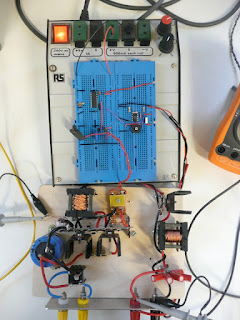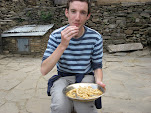After a little volcano trouble (grrr...) I finally made it back to Nepal, a year and a week to the day after I left. It was strange going back. I really wanted to see my adopted family again. Saru had had a baby boy, Bibek would be a lot bigger, and my Nepali language skills would be put to the test.
I also had some work I wanted to do. They were 3 main things:
1. Visit a project site for pico or micro hydro
2. Go to Kathmandu University at Dhulikhel, where they had a propeller turbine test rig installed.
3. Collect some data on river flow - which would probably mean a trip to a Nepal Government office.
It was weird descending back into the dust bowl of cacophony that is Kathmandu. It had been a year since I was last here. I had spoken some Nepali sporadically, I had tried - and failed - to cook Nepali food, and I had done my best to keep up with the politics (nothing had happened). But sitting in the taxi weaving in and out of the traffic, reminded me how much I really missed the place. Yes, it was noisy. Yes, it was polluted. Yes, it stank. But there were things here that really never failed to touch me. When the taxi pulled up to my adopted Nepali home, I forgot all the chaos around and remembered the joys of Nepal, the warmth of the people, the taste of the food, and the unpredictability of the electricity supply - which disappeared 10 minutes after I arrived.
I spent the first week re-acquainting myself with my old Nepal life. I went to the PEEDA office, and presented them all the T-Shirts I bought in Bristol, with bristolian slang on it (http://www.beast-clothing.com/). It did take some explaining what each meant though. I spent a lot of time with my adopted family. Saru had had a baby boy, less than 1 month old, and now was living at the house for a few months as is traditional in Nepali culture. I visited the International Church, KISC, and met up with my old lunch friends, those left anyway. A great catch up.
Biraj from the PEEDA office arranged for me to visit Krishna Panthee, a hydropower installer that I met in Bhanbhane (see March 2009). Krishna was currently installing a few micro hydro schemes in Ilam. Ilam was somewhere I really wanted to go. It was in the far east of the country, and known for its tea growing (map). There was going to be a strike in a couple of days, and as Ilam was at least a days bus ride from Kathmandu, I took a flight to Jhapa in the eastern Terai, then caught a jeep back up to Ilam bazaar.
In Ilam Bazaar, I met Kumar Shrestra from NCDC (ncdcilam.org.np), an office that operated as the government service centre for micro hydro. He delivered me to my hotel, and then left me to eat dinner. In my room, I had a visit of a local cockroach, a bit of a shock when it decided to climb over me whilst I was sleeping. The next morning, there was a knock on the door. I opened it, and stood there was a small little Nepali man. He smiled at me, came in and sat down. I didn't quite understand what was going on. So, I just started to chat. I found out that his name was Amrit Pandey, and was a resident of the village Krishna was working in. He would deliver me to Ekatappa, where Krishna would meet us.
Amchowk's power house
The destroyed dam site, with the locals clearing the rock
Sitting with the locals in Amchowk
Ekatappa was a 6 hour jeep ride from Ilam Bazaar. The jeep was rather full and uncomfortable. After an hour or so, we started to go off road, bouncing along between the ruts and stones. And as normal, slowly and surely, people disembarked as we reached their villages. By the time we reached Ekatappa at the end of the road, there was only 5 of us left. In Ekatappa, there was Krishna waiting for us. The next week, I went around 3 different micro hydro projects in different states of construction. In Ekatappa, the scheme was just starting to be built, with the base of the intake canal laid. In Amchowk, they were a lot further on. There was a few metres of intake canal to be built, the dam required rebuilding after it was destroyed in floods the previous year, and an extension to the intake canal was being built using penstock pipe. The third was up stream from the Amchowk site. It had been operational for the last 2 years, and was still working well.
The access road down to the power house site
The new intake, with bamboo scaffolding
Installing the transmission lines
I watched the people in Amchowk rebuilding their dam, and talked with them about their aspirations for electricity. Some people wanted TVs, others to charge their mobile phones, but most were just looking forward to clean light. Something that we in the west take very much for granted. In Amchowk, I stayed with the Baskota family, a wonderfully friendly family who welcomed me in with typical Nepali charm.
An old lady from Amchowk

At the time I was in Ilam, it was the same time as the UK General Elections. When I woke up the morning after the elections, Nepali radio declared Labour the winners. 2 hours later, the Tories had won an overall majority, by the end of the day the coalition Con-Lib was going to be formed. It was strange listening to UK politics on Nepali radio, another countries take on your so-called democracy. They were in awe of the way we voted. It made me feel a little bit guilty. This was the first election I was going to have voted in, and even this time it was by proxy (thanks Hannah!). But in a country like Nepal, the vote was something that was cherished, that people not one generation back had fought tooth and nail for, and there we were with turnout 65%. It felt pathetic - did we not recognise the importance of our votes?
The strike kept on going. After 5 days, I had seen everything that I wanted to, and really needed to get back to Kathmandu. However, there was no transport. When the strike finally ended after 8 days, the rain started, and the roads became impassible. So, Krishna and I had to wait a couple of days more before returning to Ilam Bazaar. Krishna saw me down to Birtamod in the Terai, from where I caught a bus to Didi's house. The bus ride was fairly uneventful - apart from the goat's backside in my face for a good hour - until I had to change buses. I was to catch a local bus to Lalbandi, which was 45 minutes from the road junction I was stood at. The first bus that pulled up I climbed aboard. It was packed, nothing new for a Nepali bus, but now the heat of the day had really started to kick in. Outside was a balmy 40 degrees, but inside it must have been over 50. There was nowhere to sit down, and I was forced to stand up with my head twisted parallel to the ground, the roof of the bus definitely not made for tall people to stand up in. By the time I fell out of the bus in Lalbandi, I had lost several stones through sweating and my clothes were reduced to towelling.
Bibek, Didi's son, had lived in Kathmandu during my year in Nepal. We went on several adventures together (here and here). But now, he had returned to live with his Mum and Dad in the Terai. I got a lift on a bike from Lalbandi to their village, about 5km away, and saw Didi outside her house working. We chatted for a long time, then I succumbed to the heat and fell asleep upstairs. I was warned about the snakes that would be there. next thing I knew, I was woken by Bibek staring at me shouting 'Sam-mama' (Uncle Sam). Kathmandu didn't seem the same without him, but I was glad he was here. In his village he could play, be with people his own age and do all the things that naughty little boys should do. We spent the next day walking around the village, Bibek showing me the maize that they were just about to cut, the cobra holes and how low the river had got - it was non-existant now, very different from the time I bathed in it with an audience.
After two nights in the heat of the Terai, I returned to Kathmandu, via Samjhu's house in Hetauda. Samjhu had got married just before I left last time (here), and now was the proud mother to a first son, her son was born one day before Saru's. I was really happy to see that Samjhu was looking well and enjoying her married life. Back in Kathmandu I spent my last week with my family. I had named Saru's son Bob, mainly because it was a name that Nepali people would be easily be able to pronounce.
After getting hopelessly lost around Dhulikhel, I went to visit John Cannell at Kathmandu University's Engineering Campus. There, he had set up a full size low head pico hydro test rig, and was conducting experiments on different propeller turbines. It was really interesting to speak with someone who had spent so long in Nepal working as a missionary, trying to build engineering capability, and seeing how he saw the world. I also had the great pleasure of visiting Kathmandu Alternative Power and Energy Group, who were currently running a project to build wind turbines out of locally made material and with local wood carving skills. Rakesh from KAPEG was a proper engineer, ready to turn his hand to anything and a fantastic experimenter. I left Dhuilikhel more inspired to get things up and going with my PhD in the UK.
And as always is the way, far too quickly it was all over again. I found myself packing, and getting ready to go to the airport. As I left, I was sad that I hadn't spent a long time here, a month flies by especially when last time was a whole year, but re-energised with the real life situations that I could put my research into practice with. I now have the task of trying to keep hold of that enthusiasm...
SAM

























